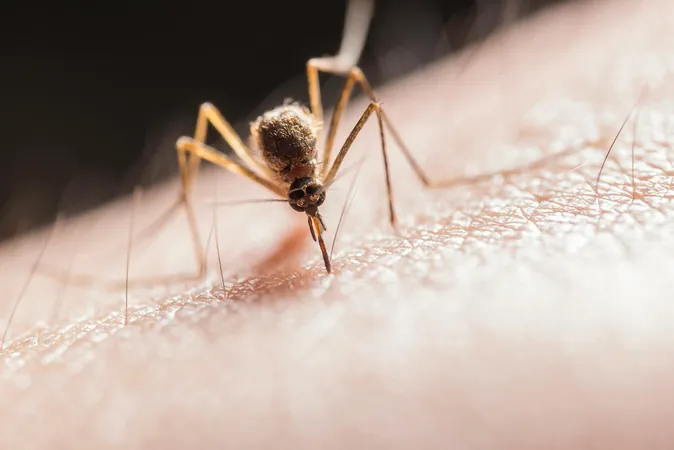
Mosquito-Borne Pathogens: A Looming Threat as Climate Change Accelerates
2024-09-22
Author: John Tan
Introduction
As the planet warms and extreme weather events become more frequent, infectious disease professionals are ringing alarm bells over mosquito-borne pathogens. A recent survey by the Abbott Pandemic Defense Coalition reveals that a staggering 61% of infectious disease experts believe that these pathogens pose the greatest threat to public health in light of climate change.
Current Threats
This alarming assessment highlights an array of viruses transmitted by mosquitoes, including dengue fever, Zika virus, West Nile virus, and malaria—all diseases that are already endemic in various regions, particularly in Latin America and Africa. With rising temperatures and increased flooding, these diseases are expected to spread further, pushing mosquitoes into new areas and amplifying the risk of outbreaks. Scientists warn that by 2050, approximately 1.3 billion people could be affected by the Zika virus, while projections indicate that 61% of the global population may face the threat of dengue fever by 2080.
Expert Opinions
Dr. Jorge Osorio, a prominent figure in global health research, emphasizes the urgency of addressing this issue. "Temperature increases and extreme weather are reshaping interactions among humans, animals, and insects, causing mosquito-borne viruses to appear in previously unaffected regions," he stated. "A coordinated global response is essential to learn from countries successfully managing these diseases and to implement effective surveillance and intervention strategies."
The Role of Abbott Pandemic Defense Coalition
The Abbott Pandemic Defense Coalition, dedicated to early detection and rapid response to potential pandemics, stresses the importance of identifying and monitoring emerging diseases. Their mission entails not only tracking known viruses but also developing sophisticated systems much like those used for predicting storms and hurricanes. Dr. Gavin Cloherty, head of infectious disease research at Abbott, asserts, "Disease surveillance serves as our radar, allowing us to prioritize which pathogens pose the highest outbreak risks and where."
Key Findings from the Survey
1. **Rising Public Health Threat**: Over 60% of surveyed professionals identified mosquito-borne viruses as a primary concern due to shifting environmental conditions.
2. **Expanding Diagnosis**: More than 100 experts in virology, epidemiology, and infectious diseases provided insights on how climate change influences health threats and proposed solutions for bolstering healthcare systems.
3. **Urgent Recommendations**: Survey participants urged a proactive approach, including enhancing public health surveillance to swiftly identify outbreaks, utilizing available funding for training future virus hunters, and increasing public awareness of infectious diseases.
Main Priorities Moving Forward
Experts advocate for focusing on three main priorities moving forward:
- **Addressing Readiness Gaps**: Strengthening public health surveillance and response systems is crucial to manage emerging pathogens effectively. Investing in these systems will ensure they are robust enough to handle future outbreaks.
- **Targeting High-Risk Pathogens**: It is vital to identify which outbreaks have the potential for large-scale health impacts. Understanding the characteristics of these risks helps prioritize responses aimed at safeguarding public health.
- **Researching Environmental Changes**: A clarion call for continued research and investment into how the dynamic interactions between humans, animals, and insects evolve is paramount. Such studies will guide health experts in crafting more precise preventive measures.
Conclusion
As climate change continues to alter our world, the threat posed by mosquito-borne pathogens cannot be underestimated. The findings from this survey serve as a wake-up call for a collaborative international effort to bolster our defenses against these changing health threats.
Call to Action
**Stay informed and proactive, because the next outbreak could be closer than you think!**



 Brasil (PT)
Brasil (PT)
 Canada (EN)
Canada (EN)
 Chile (ES)
Chile (ES)
 España (ES)
España (ES)
 France (FR)
France (FR)
 Hong Kong (EN)
Hong Kong (EN)
 Italia (IT)
Italia (IT)
 日本 (JA)
日本 (JA)
 Magyarország (HU)
Magyarország (HU)
 Norge (NO)
Norge (NO)
 Polska (PL)
Polska (PL)
 Schweiz (DE)
Schweiz (DE)
 Singapore (EN)
Singapore (EN)
 Sverige (SV)
Sverige (SV)
 Suomi (FI)
Suomi (FI)
 Türkiye (TR)
Türkiye (TR)